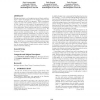62 search results - page 6 / 13 » Learning and Exploiting Relative Weaknesses of Opponent Agen... |
120
click to vote
AAAI
2006
15 years 3 months ago
2006
We embark on an initial study of a new class of strategic (normal-form) games, so-called ranking games, in which the payoff to each agent solely depends on his position in a ranki...
195
click to vote
Publication
We introduce a class of learning problems where the agent is presented with a series of tasks. Intuitively, if there is relation among those tasks, then the information gained duri...
ATAL
2007
Springer
15 years 8 months ago
2007
Springer
Making commitments, e.g., through promises and threats, enables a player to exploit the strengths of his own strategic position as well as the weaknesses of that of his opponents....
102
click to vote
ATAL
2005
Springer
15 years 7 months ago
2005
Springer
Robust sequence prediction is an essential component of an intelligent agent acting in a dynamic world. We consider the case of near-future event prediction by an online learning ...
123
click to vote
ATAL
2007
Springer
15 years 8 months ago
2007
Springer
Regret based algorithms have been proposed to control a wide variety of multi-agent systems. The appeal of regretbased algorithms is that (1) these algorithms are easily implement...

